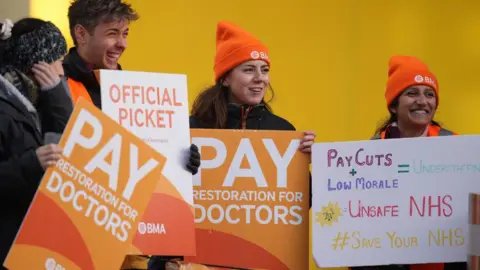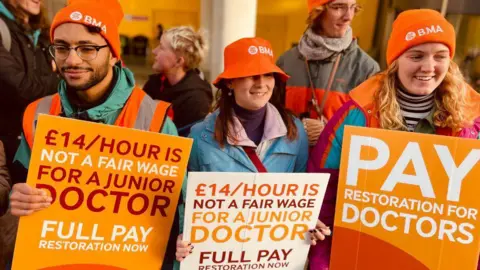Six-day junior doctors strike begins in South East
 Eddie Mitchell
Eddie MitchellHospitals and health services across south-east England are bracing themselves for the longest and “most difficult” strike in NHS history.
Junior doctors across England began six days of industrial action at 07:00 GMT on Wednesday.
The walkout follows the breakdown of pay talks between the government and members of British Medical Association (BMA), who are calling for a 35% pay increase.
Lewes MP and former nurse Maria Caulfield urged the junior doctors to “come back around the table” to negotiate.
Junior doctors, who make up half the doctor workforce in the NHS, have taken part in 28 days of strike action in their pay dispute since March 2023.
During the previous walkout between 20 and 23 December, 8,480 outpatient appointments and 1,329 elective procedures were rescheduled in south-east England.
Allison Cannon, chief nursing officer at NHS Sussex, said preparations had been made in the build up to the walkout.
“We recognise that this is a long period of industrial action,” she said.
“We have been planning really carefully for this, so we are confident in terms of the work that our healthcare partners have been putting in place leading up to this.”
 BBC/Mark Norman
BBC/Mark NormanMeanwhile, health chiefs in Surrey are warning patients to expect significant disruption as urgent, emergency, trauma, maternity and critical care are prioritised over routine and scheduled appointments.
Matt Jarratt, chief operating officer of the Royal Surrey NHS Foundation Trust, said: “Our junior doctors have our full support, whether they choose to participate in industrial action or not.
“But we know this strike action will put more pressure on frontline services and our staff.”
NHS Kent and Medway chief medical officer, Kate Langford, said there was “no doubt” the strikes impacted patient care.
“Patients are having appointments cancelled and rescheduled, and I never underestimate the emotional toll that takes on people who are waiting to access the care they need,” she said.
Dr Charlotte Canniff, chief medical officer for Surrey Heartlands Health and Care Partnership, added: “We have well-rehearsed plans in place to manage these periods of disruption.
“However, due to the timing, and with this being the longest period of planned industrial action the NHS has ever seen, we expect this to be the most difficult period of action yet.”
'The only way'
Joe Kendall from the BMA said junior doctors were “forced” to make the decision to strike.
“Going on strike is the last thing I want junior doctors to do, but it is the only way in which the government is listening to us,” he told BBC Radio Sussex.
Ms Caulfield said about 35,000 procedures were cancelled every day of the strike action.
“They have to be fitted back into the system somewhere, and that means added delays for everyone else,” she said.
“We would urge the junior doctors to come back around the table.”
The strike is due to last until 07:00 on 9 January.
Follow BBC South East on Facebook, on X, and on Instagram. Send your story ideas to [email protected].
